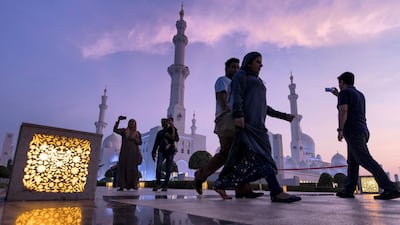It’s not easy forming new habits – whether they be based around going to the gym, eating better or being more financially savvy. As worthwhile as these initiatives are, they often dissolve under the grind of our hectic daily lives – or worse, our lack of self-belief.
How many times have we set ourselves goals just to watch them perish under the light of initial failure and cynicism? This is why I find Ramadan special. Unlike the resolutions we set at the turn of the year – which, let’s face it, by now are all but a distant memory – the holy month provides us with ample opportunity to allow much-needed adjustments to make the goals that we set become a permanent part of our lives.
A lot of it comes down to the fact that it is indeed a full month of reflection, and with scientific reports claiming that a new habit – if implemented daily – can become automatic in 18 days, Ramadan is a better time to adjust one's lifestyle.
Such was the case with my friend Jaa'fer, who credits the intensive and regular post-suhoor workout regimen he began last Ramadan for allowing gym to become a priority in his life. The daily rhythms of the holy month also improved family life for my Emirati mate, Ahmed. He says the daily act of breaking the fast in the family home allowed certain tensions to wither away.
“It is about the face-to-face interaction,” he told me during a suhoor in the capital this week. “A lot of the time, the family problems begin, I think, when the family don’t see each other. People don’t talk and that makes certain people, and I would include myself, think negative things about each other. In Ramadan, we break the fast every day and everything is resolved through discussions. That is a blessing of Ramadan I never realised.”
I was inspired by my friend’s insight, and on the drive home realised that, for me, this Ramadan was the ideal time to revive some long-lost relationships.
Before it began a week ago, such an idea was fraught with doubt, mostly because of the lack of context behind it. Ramadan does away with such notions and allows us to make contact, while keeping our pride intact.
I found a simple “hey man, long time no chat, Ramadan Mubarak” was more than enough to kick-start stalled friendships without any of the awkwardness that usually exists.
This is what the holy month does: it allows us daily opportunities to become the best versions of ourselves. I catch glimpses of this when I stroll through my old neighbourhood of Darat Al Miyah in Khalidiyah. Normally the busy area is fast-paced and a fierce hub of trade but during this period a sense of peace arrives.
On the third day of Ramadan, I got a first-hand look at this. I was back in the old 'hood dropping off my laundry when a lack of parking nous by a fellow road user caused the person in the car behind him to lose his cool. The man got out of the car and mercilessly railed at the startled driver. It was at this moment that two men approached the angered older gentlemen and reproached him gently, reminding him of the Islamic principle that his fast will be invalidated if he continued to curse.
__________________
Read more from Saeed:
How speaking in Arabic will add colour to my vocabulary this Ramadan
The challenges of Ramadan should be welcomed
Abu Dhabi has become a home very far away from home for many expats
Brushing off the stigma of baldness
_________________
“Brother, be careful of the fast, don’t lose it,” one of the men said, placing a friendly arm on the man’s shoulder.
“Forgive him, he doesn’t know,” said the other. Thankfully, the man eventually calmed himself, shook his head and drove off.
Another example of such community kindness was experienced in the final minutes leading up to the breaking of the fast, when a young Emirati walked into the House of Tea, silently paid for 30 cups of karak and sandwiches to be distributed to the local neighourhood, then drove off.
Immediately inspired, I approached another tea shop down the road and made a similar order. “Already done,” the man at the counter said. “Arbab [the owner of the store] already paid for the meals for the next two weeks. Then somebody else has paid for the next five days, so you can go after.”
We both smiled, realising that we were watching the magic of Ramadan at work.


